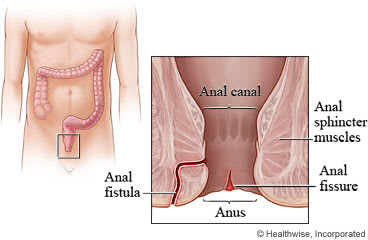What is lateral internal sphincterotomy?

Lateral internal sphincterotomy is a type of surgery. It helps heal an anal fissure that hasn't improved with medicine or other treatments. An anal fissure is a tear in your anus.
You may be asleep during surgery. Or you may be awake. If you are awake, you will get medicine to help you relax. The doctor will put a lighted tube called a scope into the anus. Then, using special surgical tools, the doctor will make a cut (incision) in the ring of muscle that controls the anus. This ring of muscle is called your internal anal sphincter.
The surgery usually takes less than 30 minutes. Most people go home the same day.
For many people, the pain from their anal fissure goes away within several days. You will probably be able to go back to work and your usual activities in about 1 to 2 weeks. But it could take 6 weeks to completely heal.
How do you prepare for surgery?
Surgery can be stressful. This information will help you understand what you can expect. And it will help you safely prepare for surgery.
Preparing for surgery
- Understand exactly what surgery is planned, along with the risks, benefits, and other options.
- Tell your doctor ALL the medicines, vitamins, supplements, and herbal remedies you take. Some may increase the risk of problems during your surgery. Your doctor will tell you if you should stop taking any of them before the surgery and how soon to do it.
- If you take aspirin or some other blood thinner, ask your doctor if you should stop taking it before your surgery. Make sure that you understand exactly what your doctor wants you to do. These medicines increase the risk of bleeding.
- Make sure your doctor and the hospital have a copy of your advance directive. If you don’t have one, you may want to prepare one. It lets others know your health care wishes. It’s a good thing to have before any type of surgery or procedure.
- Be sure you have someone to take you home. Anesthesia and pain medicine will make it unsafe for you to drive or get home on your own.
What happens on the day of surgery?
- Follow the instructions exactly about when to stop eating and drinking. If you don't, your surgery may be canceled. If your doctor told you to take your medicines on the day of surgery, take them with only a sip of water.
- Follow your doctor's instructions about when to bathe or shower before your surgery. Do not apply lotions, perfumes, deodorants, or nail polish.
- Take off all jewelry and piercings. And take out contact lenses, if you wear them.
- You may need to empty your colon with an enema or laxative. Your doctor will tell you how to do this.
At the hospital or surgery center
- Bring a picture ID.
- You will be kept comfortable and safe by your anesthesia provider. The anesthesia may make you sleep. Or it may just numb the area being worked on.
- The surgery will take about 30 minutes.
Current as of: October 19, 2024
Author: Ignite Healthwise, LLC Staff
Clinical Review Board
All Ignite Healthwise, LLC education is reviewed by a team that includes physicians, nurses, advanced practitioners, registered dieticians, and other healthcare professionals.

